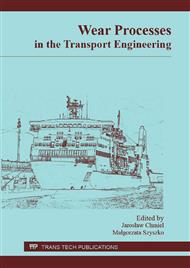p.1
p.11
p.21
p.31
p.41
p.51
p.61
p.71
p.81
The Influence of Fuels Quality on Tribological Wear in Slow Speed Diesel Engines
Abstract:
In this article, there are presented problems of tribological wear occurring in slow speed diesel engines elements such as piston – piston rings – cylinder liner assembly and fuel injection pumps caused by use of poor quality fuels. There are defined specific quality standards for bunkered marine residual and distillate fuels with accordance to ISO Standard 8217:2010 and recommended by engine maker’s fuel quality at engine inlet. Moreover, there are characterized common contaminants in this fuels with special attention to the most harmful the residual fuel catalytic particles so-called Cat-Fines, specified the maximum limits and described their influence on engine’s tribological pairs. Furthermore, this paper considers the operational precautions and treatment of poor quality fuels with elaboration of specific procedures to prevent and reduce the influence of Cat-fines to tribological wear in engine elements containing issues of fuel oil storage and distribution on board, fuel oil treatment, usage of poor quality fuels and condition monitoring of engine elements.
Info:
Periodical:
Pages:
1-10
DOI:
Citation:
Online since:
July 2016
Authors:
Price:
Сopyright:
© 2016 Trans Tech Publications Ltd. All Rights Reserved
Share:
Citation:


